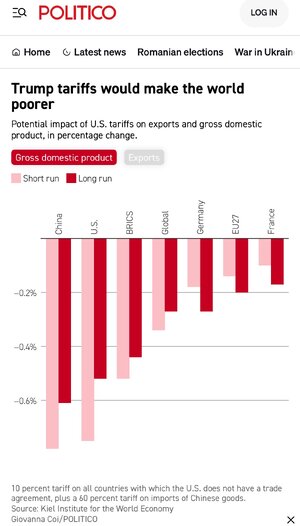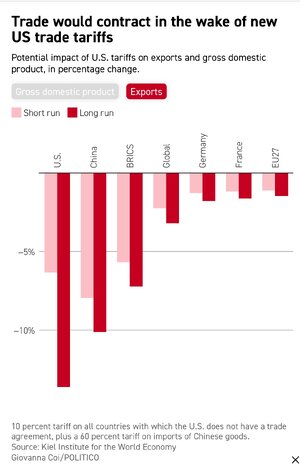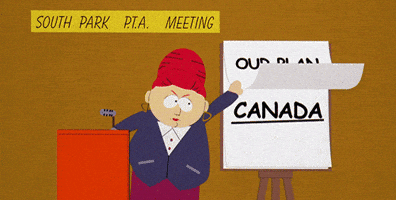Navigation
Install the app
How to install the app on iOS
Follow along with the video below to see how to install our site as a web app on your home screen.
Note: This feature may not be available in some browsers.
More options
You are using an out of date browser. It may not display this or other websites correctly.
You should upgrade or use an alternative browser.
You should upgrade or use an alternative browser.
Trump / Musk (other than DOGE)
- Thread starter nycfan
- Start date
- Replies: 12K
- Views: 705K
- Politics
ChileG
Inconceivable Member
- Messages
- 3,149
The defense against this stupidity is, “Trump isn’t actually going to do it.”
But when campaigning, whenever asked how he would fund his various promises (like his hilarious answer about his plan for childcare), he would claim the tariffs would pay for everything.
Now, maybe Trump was just lying about his plans, which wouldn’t come as a surprise to anyone, even his supporters.
But I think it is more likely he just doesn’t know what he is doing, and his acolytes will sane wash whatever happens.
But when campaigning, whenever asked how he would fund his various promises (like his hilarious answer about his plan for childcare), he would claim the tariffs would pay for everything.
Now, maybe Trump was just lying about his plans, which wouldn’t come as a surprise to anyone, even his supporters.
But I think it is more likely he just doesn’t know what he is doing, and his acolytes will sane wash whatever happens.
- Messages
- 41,065
“… He isn’t yet sure how to measure academic freedom, but he has looked at how a nonprofit called Foundation for Individual Rights in Education scores universities in its freedom-of-speech rankings, a person familiar with his thinking said.
The nonprofit scores schools based on a survey of students’ perceptions of factors such as whether they feel comfortable expressing ideas. Schools are also penalized if their administrators sanction faculty for opinions or disinvite a speaker from a campus event after a controversy.
Universities that are leading recipients of NIH grants but have poor FIRE rankings include the University of Pennsylvania (“very poor”), Columbia University (“abysmal”) and the University of Southern California (“very poor”). Schools with top scores in FIRE’s most recent rankings are the University of Virginia, Michigan Technological University and Florida State University. …”
- Messages
- 41,065
(Cont’d)
“… “It’s not clear why we’d roadblock the best chances of finding a cure for cystic fibrosis or cancer or Alzheimer’s by adding potentially political, nonresearch factors into medical-research grant decisions,” said Lizbet Boroughs, associate vice president of government relations for the Association of American Universities, which represents 71 research schools.
Ned Sharpless, a former director of the National Cancer Institute, said Bhattacharya is qualified to lead the NIH but might find it difficult to implement broad changes. The agency could tweak the rubric used to assess grant applications to look at academic freedom, but could find it difficult to force grant reviewers to faithfully follow the change.
… Bhattacharya is a professor of medicine and health policy at Stanford. During the pandemic, he criticized the Covid-19 response, helping write the Great Barrington Declaration that called for ending lockdowns and isolating the vulnerable so that young, healthy people could get infected and build up immunity in the general population. …”
For reference, FIRE worst colleges for free speech 2024: 10 Worst Colleges for Free Speech: 2023
“… “It’s not clear why we’d roadblock the best chances of finding a cure for cystic fibrosis or cancer or Alzheimer’s by adding potentially political, nonresearch factors into medical-research grant decisions,” said Lizbet Boroughs, associate vice president of government relations for the Association of American Universities, which represents 71 research schools.
Ned Sharpless, a former director of the National Cancer Institute, said Bhattacharya is qualified to lead the NIH but might find it difficult to implement broad changes. The agency could tweak the rubric used to assess grant applications to look at academic freedom, but could find it difficult to force grant reviewers to faithfully follow the change.
… Bhattacharya is a professor of medicine and health policy at Stanford. During the pandemic, he criticized the Covid-19 response, helping write the Great Barrington Declaration that called for ending lockdowns and isolating the vulnerable so that young, healthy people could get infected and build up immunity in the general population. …”
For reference, FIRE worst colleges for free speech 2024: 10 Worst Colleges for Free Speech: 2023
Last edited:
Mulberry Heel
Inconceivable Member
- Messages
- 3,966
“… He isn’t yet sure how to measure academic freedom, but he has looked at how a nonprofit called Foundation for Individual Rights in Education scores universities in its freedom-of-speech rankings, a person familiar with his thinking said.
The nonprofit scores schools based on a survey of students’ perceptions of factors such as whether they feel comfortable expressing ideas. Schools are also penalized if their administrators sanction faculty for opinions or disinvite a speaker from a campus event after a controversy.
Universities that are leading recipients of NIH grants but have poor FIRE rankings include the University of Pennsylvania (“very poor”), Columbia University (“abysmal”) and the University of Southern California (“very poor”). Schools with top scores in FIRE’s most recent rankings are the University of Virginia, Michigan Technological University and Florida State University. …”
I continue to believe that Trump 2.0 is simply going to be a shitshow from the beginning, and likely to an even greater extent than his first term. And not just chaos, but I do believe that at a minimum we'll see the federal government used to go after Trump's critics and perceived enemies in the media, government, and politics very directly - much more so than in his first term.
Mulberry Heel
Inconceivable Member
- Messages
- 3,966
It shouldn't surprise me anymore, but it does continue to amaze me that one of the main defenses of many Trump voters or apologists is: he won't actually do what he says he's going to do. The lack of critical thinking involved regarding that statement is mind-boggling. "I love it when he talks (tweets) tough, but I do know it would be really bad if he did all the shit he claims he will, but I don't worry about it because I know he's too smart to actually do it." It's like they view politics as professional wrestling. Um, yeah, whatever helps you sleep at night.The defense against this stupidity is, “Trump isn’t actually going to do it.”
But when campaigning, whenever asked how he would fund his various promises (like his hilarious answer about his plan for childcare), he would claim the tariffs would pay for everything.
Now, maybe Trump was just lying about his plans, which wouldn’t come as a surprise to anyone, even his supporters.
But I think it is more likely he just doesn’t know what he is doing, and his acolytes will sane wash whatever happens.
ZenMode
Legend of ZZL
- Messages
- 6,309
Musk, Ramaswamy eyeing federal remote work policies to help slash $2T from budget

Musk, Ramaswamy eyeing federal remote work policies to help slash $2T from budget
Work from home policies came under fire from Elon Musk as he and Vivek Ramaswamy took their plans to reduce government waste to the floors of Congress Thursday.
- Messages
- 3,299
Translation: Musk and Vivek want to make working for the federal government so miserable and unappealing that employees will quit in droves and no one will want to replace themMusk, Ramaswamy eyeing federal remote work policies to help slash $2T from budget

Musk, Ramaswamy eyeing federal remote work policies to help slash $2T from budget
Work from home policies came under fire from Elon Musk as he and Vivek Ramaswamy took their plans to reduce government waste to the floors of Congress Thursday.abcnews.go.com
ZenMode
Legend of ZZL
- Messages
- 6,309
Make it miserable how?Translation: Musk and Vivek want to make working for the federal government so miserable and unappealing that employees will quit in droves and no one will want to replace them
- Messages
- 3,299
In this particular example, by eliminating the flexibility and autonomy that comes with full or partial remote work, which almost all employees in white-collar industries are now looking for to some degree. And many federal employees have gotten used to it as part of their jobs. Example: I have a couple law school classmates who work at the USPTO. Currently, after a couple years in DC, trademark examiners are able to work remotely from virtually anywhere in the US. (That policy long predates COVID.) That is a very attractive benefit, because a lot of people don't want to work in DC, and there's no real practical reason why they need to. Telling them they're all going to lose their jobs unless they move back to DC to work in a specific office is going to cause many of them to quit, and make it much harder to attract trademark examiners in the future.Make it miserable how?
But don't ask me - Vivek himself has been very transparent about the fact that he is hoping that forcing federal employees to work in an office full-time will result in large numbers of them quitting. They know it's very difficult to fire large numbers of government employees (and rightfully so) so they're hoping to just force them to quit instead. They'll basically treat federal workers like Milton in Office Space - just keep degrading them and making their jobs worse by degrees in hope that they'll eventually get the message and just quit.
- Messages
- 2,533
And if all those workers do decide to come back to the office, it’s going to be a serious challenge to fit them into existing space.In this particular example, by eliminating the flexibility and autonomy that comes with full or partial remote work, which almost all employees in white-collar industries are now looking for to some degree. And many federal employees have gotten used to it as part of their jobs. Example: I have a couple law school classmates who work at the USPTO. Currently, after a couple years in DC, trademark examiners are able to work remotely from virtually anywhere in the US. (That policy long predates COVID.) That is a very attractive benefit, because a lot of people don't want to work in DC, and there's no real practical reason why they need to. Telling them they're all going to lose their jobs unless they move back to DC to work in a specific office is going to cause many of them to quit, and make it much harder to attract trademark examiners in the future.
But don't ask me - Vivek himself has been very transparent about the fact that he is hoping that forcing federal employees to work in an office full-time will result in large numbers of them quitting. They know it's very difficult to fire large numbers of government employees (and rightfully so) so they're hoping to just force them to quit instead. They'll basically treat federal workers like Milton in Office Space - just keep degrading them and making their jobs worse by degrees in hope that they'll eventually get the message and just quit.
ZenMode
Legend of ZZL
- Messages
- 6,309
The company I work for had some difficulty getting people back in the office, but it eventually gets worked out. Many of our clients are bringing people back to the office. We implemented a work from home policy that is performance based. I don't necessarily mind full-time remote work as long as there is accountability. Accountability is often lacking in government jobs.In this particular example, by eliminating the flexibility and autonomy that comes with full or partial remote work, which almost all employees in white-collar industries are now looking for to some degree. And many federal employees have gotten used to it as part of their jobs. Example: I have a couple law school classmates who work at the USPTO. Currently, after a couple years in DC, trademark examiners are able to work remotely from virtually anywhere in the US. (That policy long predates COVID.) That is a very attractive benefit, because a lot of people don't want to work in DC, and there's no real practical reason why they need to. Telling them they're all going to lose their jobs unless they move back to DC to work in a specific office is going to cause many of them to quit, and make it much harder to attract trademark examiners in the future.
But don't ask me - Vivek himself has been very transparent about the fact that he is hoping that forcing federal employees to work in an office full-time will result in large numbers of them quitting. They know it's very difficult to fire large numbers of government employees (and rightfully so) so they're hoping to just force them to quit instead. They'll basically treat federal workers like Milton in Office Space - just keep degrading them and making their jobs worse by degrees in hope that they'll eventually get the message and just quit.
If they want to go to work from home, then get rid of the buildings or at least drastically scale back the on-site seats. Having a desk for each work from home employee is a waste.
- Messages
- 3,299
I have no problem with downsizing federal government office space. What I have a problem with is a blanket policy of forcing every government worker (or the vast majority of them) back into full-time, in-person work, which is expressly intended to make working for the government less attractive.The company I work for had some difficulty getting people back in the office, but it eventually gets worked out. Many of our clients are bringing people back to the office. We implemented a work from home policy that is performance based. I don't necessarily mind full-time remote work as long as there is accountability. Accountability is often lacking in government jobs.
If they want to go to work from home, then get rid of the buildings or at least drastically scale back the on-site seats. Having a desk for each work from home employee is a waste.
- Messages
- 41,065
“… Trump’s supporters have suggested two ways to get around the Senate’s advice-and-consent process. In the first, the Senate would vote to go into recess soon after Trump’s inauguration, allowing him to unilaterally make a series of “recess” appointments. That plan may formally be legal, but it is plainly improper. The president is authorized to make recess appointments to “ensure the continued functioning of the Federal Government when the Senate is away,” as Justice Stephen Breyer wrote for the Supreme Court in 2014.
… some House Republicans have begun to discuss a more extreme scheme, one Trump considered during his first term: Trump could instead send the Senate home against its will and fill the government during the resulting “recess.” This is flagrantly unlawful.
… The House Republicans’ idea seems to be to manufacture a “disagreement” to trigger this adjournment power. First, the House of Representatives would pass a resolution calling for a recess. The Senate would then (in all likelihood) refuse to pass the resolution. Trump would then declare the houses to be in “disagreement” and adjourn both houses for as long as he likes. From there, he would start his recess-appointments spree. There is just one glaring problem: The “disagreement” in this scenario is illusory.
Under the Constitution, each house can generally decide for itself how long it will sit. As Thomas Jefferson, an expert on legislative procedure, wrote in 1790: “Each house of Congress possesses [the] natural right of governing itself, and consequently of fixing it’s [sic] own times and places of meeting.”
… The Constitution limits this autonomy in one key way: “Neither House, during the Session of Congress, shall, without the Consent of the other, adjourn for more than three days, nor to any other Place than that in which the two Houses shall be sitting.” In other words, if one house of Congress wants to leave in the middle of a session, it has to get the permission of the other house. The House of Representatives can’t just skip town if the Senate thinks important legislative business remains. But note that this provision limits each house’s power to “adjourn,” and not each house’s power to remain “sitting.” Neither house needs the agreement of the other to stay in session. If the Senate wants to let the House of Representatives leave while it considers appointments or treaties, that is perfectly fine. Indeed, there are plenty of examples of one house giving the other permission to go home. Under Article I, then, each house requires consent of the other to quit, but not to sit. …”
superrific
Master of the ZZLverse
- Messages
- 12,353
Link, or are you making things up again?Accountability is often lacking in government jobs.
- Messages
- 142
Exactly. What does such a broad statement as "Accountability is often lacking in government jobs." even mean. How was/is such a thing measured? And so now we're supposed to cut off our nose despite our face with such grand gestures of weightless insight?Link, or are you making things up again?
Share:




